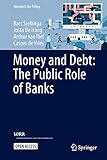Money and Debt: The Public Role of Banks [electronic resource] / by Bart Stellinga, Josta de Hoog, Arthur van Riel, Casper de Vries.
Material type: TextSeries: Research for Policy, Studies by the Netherlands Council for Government PolicyPublisher: Cham : Springer International Publishing : Imprint: Springer, 2021Edition: 1st ed. 2021Description: XII, 247 p. 41 illus., 26 illus. in color. online resourceContent type:
TextSeries: Research for Policy, Studies by the Netherlands Council for Government PolicyPublisher: Cham : Springer International Publishing : Imprint: Springer, 2021Edition: 1st ed. 2021Description: XII, 247 p. 41 illus., 26 illus. in color. online resourceContent type: - text
- computer
- online resource
- 9783030702502
- 338.9 23
- HD87-87.55
Chapter 1 Introduction -- Chapter 2 How is money created? -- Chapter 3 The history of money creation -- Chapter 4 An appraisal of the financial monetary system -- Chapter 5 How does the sovereign money system work? -- Chapter 6 Advantages and disadvantages of the sovereign money system -- Chapter 7 Policies to restore the balance in the current system -- Chapter 8 Conclusions and recommendations -- Annex I: List of experts consulted -- Annex II: Tax regime, debt and banks’ risk attitude.
Open Access
This Open Access book from the Netherlands Scientific Council for Government Policy explains how money creation and banking works, describes the main problems of the current monetary and financial system and discusses several reform options. This book systematically evaluates proposals for fundamental monetary reform, including ideas to separate money and credit by breaking up banks, introducing a central bank digital currency, and introducing public payment banks. By drawing on these plans, the authors suggest several concrete reforms to the current banking system with the aim to ensure that the monetary system remains stable, contributes to the Dutch economy, fairly distributes benefits, costs and risks, and enjoys public legitimacy. This systematic approach, and the accessible way in which the book is written, allows specialized and non-specialised readers to understand the intricacies of money, banking, monetary reform and financial innovation, far beyond the Dutch context. .
There are no comments on this title.


